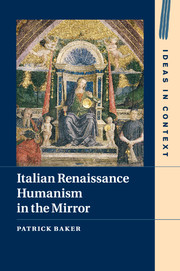
-
Select format
-
- Publisher:
- Cambridge University Press
- Publication date:
- October 2015
- September 2015
- ISBN:
- 9781316282311
- 9781107111868
- 9781107530690
- Dimensions:
- (228 x 152 mm)
- Weight & Pages:
- 0.64kg, 358 Pages
- Dimensions:
- (229 x 152 mm)
- Weight & Pages:
- 0.52kg, 360 Pages
- Subjects:
- Area Studies, History of Ideas, European History after 1450, History, European Studies, History of Ideas and Intellectual History
- Series:
- Ideas in Context (14)
You may already have access via personal or institutional login- Subjects:
- Area Studies, History of Ideas, European History after 1450, History, European Studies, History of Ideas and Intellectual History
- Series:
- Ideas in Context (14)
Book description
This important study takes a new approach to understanding Italian Renaissance humanism, based not on scholarly paradigms or philosophical concepts but on a neglected yet indispensable perspective: the humanists' understanding of themselves. Through a series of close textual studies, Patrick Baker excavates what humanists thought was important about humanism, how they viewed their own history, what goals they enunciated, what triumphs they celebrated - in short, he attempts to reconstruct humanist identity. What emerges is a small, coherent community dedicated primarily not to political ideology, a philosophy of man, an educational ethos, or moral improvement, but rather to the pursuit of classical Latin eloquence. Grasping the significance this stylistic ideal had for the humanists is essential to understanding both their sense of themselves and the importance they and others attached to their movement. For eloquence was no mere aesthetic affair but rather appeared to them as the guarantor of civilisation itself.
Reviews
'His book will serve as a useful reference. He writes with verve, makes perceptive observations, and, when he translates from the Latin, he does so competently.'
John Monfasani Source: Renaissance Quarterly
'This book, which is elegantly written and impeccably presented, provides a useful corrective to modern assumptions about Renaissance humanism; it offers a contextualized analysis of hitherto little-studied texts, and gives a more balanced account of the humanistic movement … It provides an interesting insight into the importance of studying humanistic writings produced in non-Florentine contexts, as well as in vernacular culture.'
Maude Vanhaelen Source: Modern Language Review
'However, with his methodologically stringent approach, his familiarity with the huge literature on fifteenth-century Italian humanism, and his mastery of the Latin sources, Patrick Baker actually achieves what he set out to do, namely to offer us a new and stimulating answer to an old and vexing question: how to define the essence of Renaissance humanism? I recommend his book to all students of Italian Renaissance humanism.'
Marianne Pade Source: Bryn Mawr Classical Review
Contents
Metrics
Altmetric attention score
Full text views
Full text views help Loading metrics...
Loading metrics...
* Views captured on Cambridge Core between #date#. This data will be updated every 24 hours.
Usage data cannot currently be displayed.
Accessibility standard: Unknown
Why this information is here
This section outlines the accessibility features of this content - including support for screen readers, full keyboard navigation and high-contrast display options. This may not be relevant for you.
Accessibility Information
Accessibility compliance for the PDF of this book is currently unknown and may be updated in the future.


